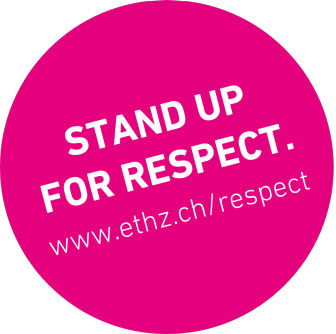Code of Conduct
The Department of Biosystems Science and Engineering (D-BSSE) follows the guidelines for equal opportunity and best practice in achieving an environment of mutual respect in accordance with the values and code of conduct of the central ETH Zurich administration. D-BSSE supports the Gender Action Plan of ETH Zurich, a code promoting equal opportunities in research and teaching, proper life/work balance and preventing sexual harassment and discrimination. D-BSSE encourages diversity and does not tolerate any discrimination towards its employees, be it on the grounds of gender or social, ethnicity or religious affiliation.

At ETH Zurich, people from different cultural backgrounds and in many varied roles and disciplines study, research and work together. Diversity is one of our strengths – and at the same time a challenge: wherever different people come together, there has to be mutual respect.
The Code of Conduct acts as a guideline for how members of our community should treat each other and highlights the values that we stand for.
Our principles
At ETH Zurich, we treat each other professionally and with mutual respect. We all share responsibility for this: professors, students, lecturers, as well as research, administrative and technical staff, and academic guests.
Respect and responsibility
We foster a responsible and supportive environment where people treat each other respectfully regardless of origin, education, religion, beliefs, physical ability, gender or sexual identity. If these values are disregarded, we will take action.
Open and fair communication, conflict resolution
We communicate openly with each other, in a spirit of goodwill. Conflicts are resolved in a fair and objective manner to produce an effective solution. Our culture is built on trust and we welcome constructive criticism. We support an open management culture based on dialogue.
Honesty and integrity
We work together in a constructive and honest fashion, where personal integrity is key. The methods, data, workflows and results of our scientific research are documented faithfully. A clear distinction is always made between our own work and the work of others. Young researchers are encouraged and promoted in a responsible manner.

